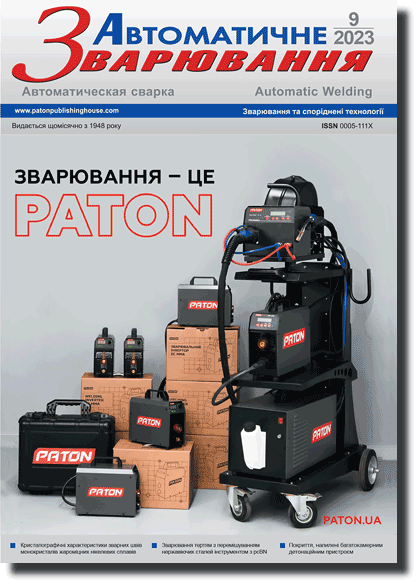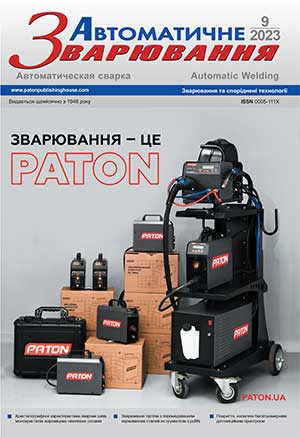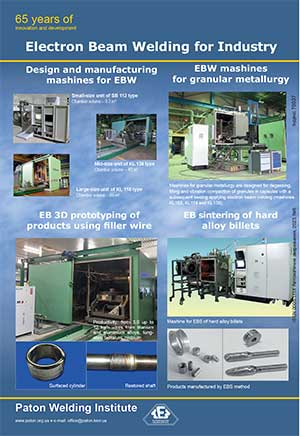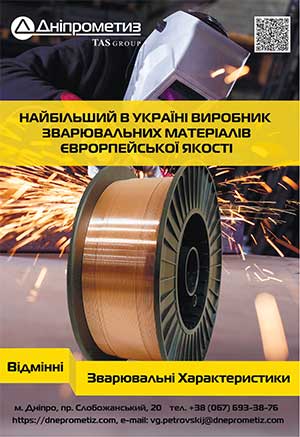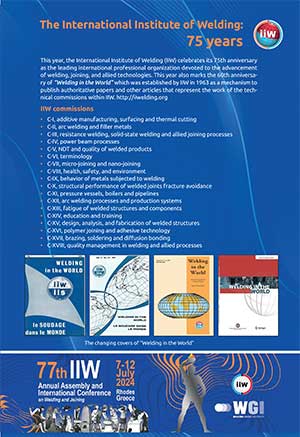| 2023 №09 (07) |
DOI of Article 10.37434/as2023.09.01 |
2023 №09 (02) |
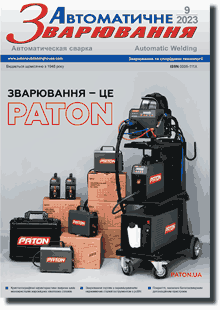
"Avtomatychne Zvaryuvannya" (Automatic Welding), #9, 2023, pp. 3-10
Crystallographic and dimensional characteristics of structure elements in welds of high-temperature nickel alloy single crystals
I.S. Gakh, B.O. Zaderyi, G.V. Zviagintseva, A.V. Zavdoveyev, Yu.V. Oliinyk
E.O. Paton Electric Welding Institute of the NAS of Ukraine. 11 Kazymyr Malevych Str., 03150, Kyiv, Ukraine. E-mail: office@paton.kiev.uaCrystallographic-orientational and dimensional-morphological features of microstructure in welded joints of high-temperature nickel alloy single crystals are considered, depending on the initial crystallographic orientation and its change over the weld solidification macrofront. EBSD analysis and optical metallography methods were used to study the structural features of individual zones of welded joints of high-temperature nickel alloy single crystals. Their dependence on the initial crystallographic orientation of the welded joint and its change over the weld pool solidification macrofront is established. It is shown that alongside the predominant inheritance of base metal crystallographic orientation by the weld metal, formation of a grain structure of different crystallographic orientation, morphology, dimensions and nature, namely solidification and deformation-induced, can be in place. The mechanisms of formation of grains of the specified nature are considered. Boundaries of solidification type grains are the junction of dendrite blocks with different crystallographic orientation. Deformation type grains are the result of relaxation of microstresses at the stage of welded joint cooling, and they form in areas where the direction of acting stresses is the closest to the crystallographic orientation of easy slip. It was also found that deformation type grains can form both in the weld metal, and in the HAZ. At the same temperature conditions of making the welded joints, the quantitative and dimensional-orientational parameters of deformation structure of the HAZ metal correlate with similar parameters of weld structure elements. The possibility to produce welds without cracks with perfect single crystal structure is indicated. 18 Ref., 8 Fig.
Keywords: single crystals, high-temperature nickel alloys, welded joints, EBSD-analysis, crystallographic orientation, structure parameters, grain nature, weld pool, solidification macrofront
Received: 14.06.2023
References
1. Logunov, A.V., Burov, M.N., Danilov, D.V. (2016) Development of power and marine engine construction in the world (Review). Dvigatel, 1, 10-13 [in Russian].2. Tsukagoshi, K., Muyama, A., Masada, J. et al. (2007) Mitsubishi Heavy Industries, Ltd. Technical Review, 44(4), 1.
3. XF9-1, the World's Best Standards Fighter Engine, Has Been Completed - Japan's Military Technology, Interview with the Developer, BLOGOS, Part 1/2 (2019) (in Japanese).
4. Hino, T., Kobayashi, T., Koizumi, Y. et al. (2000) Superalloys (Eds. T.M. Pollock, R.D. Kissinger, R.R. Bowman, K.A. Green, M. McLean, S. Olson, and J.J. Schirm) (TMS: 2000).
5. Koizumi, Y., Kobayashi, T., Yokokawa, T. et al. (1998) Cost Conf. Liege, part 2: 1089.
6. Langston, L.S. (2014) Global Gas Turbine News, 9, 76. https://doi.org/10.1115/9.2014-Sep-9
7. Park, J.W., Vitec, J.M., Babu, S.S., David, S.A. (2004) Stray grain formation, thermomechanical stress and solidification cracking single crystal nickel base superolloy welds. Science and technology of welding and Joining, 9 (6), 472-482. https://doi.org/10.1179/136217104225021841
8. Yushchenko, K.A., Gakh, I.S., Zadery, B.A. et al. (2013) Influence of weld pool geometry on structure of metal of welds on high-temperature nickel alloy single crystals. The Paton Welding J., 5, 45-50.
9. Yushchenko, K.A., Zadery, B.A., Karasevskaya, O.P. et al. (2009) On possibility of inheritance of single crystal structure of complex nickel alloys in nonequilibrium conditions of fusion welding. Metallofizika i Novejshie Tekhnologii, 31(4), 473-485 [in Russian].
10. Anderson, T.D., Du Pont, J.N. (2011) Stray grain formation and solidification cracking susceptibility of single crystal Ni base superalloy CMSX-4. Welding Journal, 2, 27-31.
11. Karasevska, O.P., Yushchenko, K.A., Zaderiy, B.O. et al. (2021) Deformation and fracture of single crystals of highstrength nickel alloys with welded joints during tensile testing. Metalofizyka. Novitni Tekhnol., 43(7), 939-957 [in Ukrainian]. https://doi.org/10.15407/mfint.43.07.0939
12. Golubovsky, E.P., Svetlov, I.L., Epishin, A.I. (2005) Influence of crystal-lattice orientation on strength characteristics of single crystals of high-temperature nickel alloy. Nauchnye Trudy MATI, Issue 8 (80). Moscow, ITsMATI, 22-27 [in Russian].
13. Shvarts, A., Kumar, M., Adams, B. et al. (2004) Diffraction method of reflected electrons. Moscow, Tekhnosfera [in Russian].
14. Varyukhin, V.N.., Pashinskaya, E.G., Zavdoveev, A.V. et al. (2014) Possibilities of diffraction method of back scattered electrons for analysis of structure of wrought materials. Kyiv, Naukova Dumka [in Russian].
15. Shalin, R.E., Svetlov, I.L., Kachanov, E.B. et al. (1997) Single crystals of high-temperature nickel alloys. Moscow, Mashinostroenie [in Russian].
16. Gakh, I.S. (2011) Physical-technological features of electron beam welding of high-nickel high-strength alloys with single crystal structure. In: Syn. of Thesis for Cand. of Techn. Sci. Degree. Kyiv [in Ukrainian].
17. Yushchenko, K.A., Zadery, B.A., Gakh I.S. et al. (2021) Features of the Microstructure of Welded Joints of Single Crystals of Heat-Resistant Nickel Alloys. Metallofiz. Noveishie Tekhnol., 43, 9, 1175-1193. https://doi.org/10.15407/mfint.43.09.1175
18. Yushchenko, K.A., Zadery, B.A., Gakh I.S. et al. (2016) Formation of weld metal structure in electron beam welding of single crystals of high-temperature nickel alloys. The Paton Welding J., 8, 15-22. https://doi.org/10.15407/tpwj2016.08.04
Advertising in this issue:
The cost of subscription/purchase order journals or individual articles
| Journal/Currency | Annual Set | 1 issue printed |
1 issue |
one article |
| TPWJ/USD | 384 $ | 32 $ | 26 $ | 13 $ |
| TPWJ/EUR | 348 € | 29 € | 24 € | 12 € |
| TPWJ/UAH | 7200 UAH | 600 UAH | 600 UAH | 280 UAH |
| AS/UAH | 1800 UAH | 300 UAH | 300 UAH | 150 UAH |
| AS/USD | 192 $ | 32 $ | 26 $ | 13 $ |
| AS/EUR | 180 € | 30 € | 25 € | 12 € |
| SEM/UAH | 1200 UAH | 300 UAH | 300 UAH | 150 UAH |
| SEM/USD | 128 $ | 32 $ | 26 $ | 13 $ |
| SEM/EUR | 120 € | 30 € | 25 € | 12 € |
| TDNK/UAH | 1200 UAH | 300 UAH | 300 UAH | 150 UAH |
| TDNK/USD | 128 $ | 32 $ | 26 $ | 13 $ |
| TDNK/EUR | 120 € | 30 € | 25 € | 15 € |
AS = «Automatic Welding» - 6 issues per year;
TPWJ = «PATON WELDING JOURNAL» - 12 issues per year;
SEM = «Electrometallurgy Today» - 4 issues per year;
TDNK = «Technical Diagnostics and Non-Destructive Testing» - 4 issues per year.




